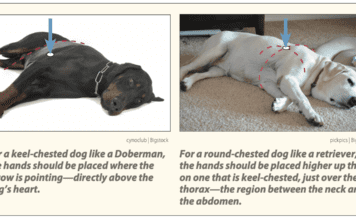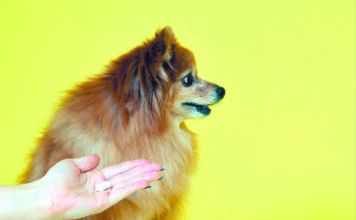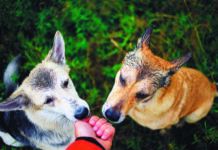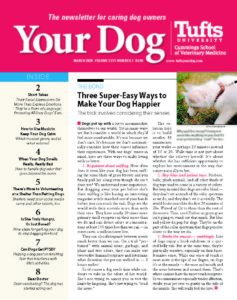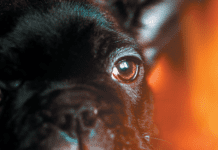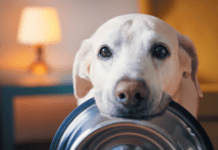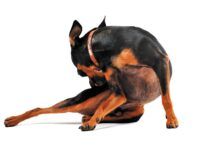What It Means If Your Dog’s Nose is Warm and Dry
A lot of people believe that a cool, moist nose is a sign of good health in a dog and a warm dry one means something’s wrong. But that’s not the case.
Subscribe to Tufts Your Dog
Already Subscribed?
Click Here to Sign In | Forgot your password? | Activate Web AccessCan the other eye be saved?
Q: My son realized that his 8-year-old golden retriever lost vision in one of her eyes. She was diagnosed with something the doctor called pigmentary uveitis. The veterinary ophthalmologist indicated that the pressure in her eye was very high, causing pain, and recommended removing the eye. My son followed the recommendation, but what can be done to prevent this wonderful dog from getting pigmentary uveitis in her other eye?
Subscribe to Tufts Your Dog
Already Subscribed?
Click Here to Sign In | Forgot your password? | Activate Web AccessYour Dog Has Swallowed Something He Shouldn’t Have. Now What?
One thing new research makes clear. If your dog has swallowed a non-food item and is showing signs of not feeling well—vomiting, lethargy, lack of appetite, diarrhea, inability to void solid waste—you should not delay getting him to the veterinarian’s office. Investigators went through the records of dogs who had been taken to the hospital because they had ingested a foreign body and were treated with conservative medical management rather than surgery. The result: those dogs who were brought in more than one day after their symptoms started were not as likely to have successful outcomes. They more frequently ended up needing an operation.
Subscribe to Tufts Your Dog
Already Subscribed?
Click Here to Sign In | Forgot your password? | Activate Web AccessThe Cost of Serious Illness: One Penny
Ingestion of a single penny minted after 1982 is enough to kill a dog weighing fewer than 50 pounds. That’s because pennies minted after that year have a copper coating but are almost 98 percent zinc, which is highly toxic to dogs. Lest you think zinc poisoning is uncommon, the Animal Poison Control Center (888-426-4435) reports more than 4,000 cases of zinc toxicity every year. Pennies are usually the cause. But dogs, being the indiscriminate eaters they are, also swallow other zinc-containing items, including batteries, staples, nuts and bolts, zippers, board game pieces, jewelry….
Subscribe to Tufts Your Dog
Already Subscribed?
Click Here to Sign In | Forgot your password? | Activate Web AccessShaking: When to Worry; When Not to
If your dog keeps shaking her head, take her to the vet. She could be afflicted with anything from an ear infection to a neurological issue. But if she does full-body shakeouts, there’s nothing to be concerned about. It’s just her way of regrouping or transitioning from one activity to another.
Subscribe to Tufts Your Dog
Already Subscribed?
Click Here to Sign In | Forgot your password? | Activate Web AccessWhen the Disease Has Been Treated But the Disease-Induced Behavior Doesn’t Stop
Your dog has started drinking more water and begun urinating in the house. You take her to the veterinarian for a workup and discover she has Cushing’s disease. The doctor prescribes the appropriate medication and you administer it faithfully, but your dog continues to urinate indoors, which she has not done since she was a puppy. Was the disease misdiagnosed? Is she on the wrong medication, or the wrong dose?
Subscribe to Tufts Your Dog
Already Subscribed?
Click Here to Sign In | Forgot your password? | Activate Web AccessBowl-ing
Stainless steel, glass, ceramic, plastic—does it really matter which material you choose for your dog’s food bowl? Yes. Here’s why.
Subscribe to Tufts Your Dog
Already Subscribed?
Click Here to Sign In | Forgot your password? | Activate Web AccessHelp Your Dog Live a Longer, Healthier Life
Many dog owners aren’t sure how to determine their dog’s body condition. Even more confusing, a recent Pet Obesity U.S. Prevalence Survey found that more than a third of people with dogs consider their body condition “normal” when their veterinarians actually classified the pets as overweight or obese. So where might this disconnect come from?
Subscribe to Tufts Your Dog
Already Subscribed?
Click Here to Sign In | Forgot your password? | Activate Web AccessYou’ve Told the Vet Your Dog’s Symptoms, But Have You Told Him Your Dog’s...
Your dog has begun urinating in the house, something she hasn’t done since she was a puppy. You take her to the vet to find out what’s wrong.
Subscribe to Tufts Your Dog
Already Subscribed?
Click Here to Sign In | Forgot your password? | Activate Web AccessSniffing out illness in another dog?
Q: Are there any dogs that can sniff out cancer in other dogs? My chow chow initiates play with my golden retriever by nipping at his back leg and then backing off. Last year the golden had a small area of missing hair on his back leg, and the vet looked at it during his yearly exam. There was no broken skin, and the doctor didn’t see any cut or foreign object. The vet said that whatever it was, it had already healed and I didn’t need to do anything for the patch of missing hair. He suggested I might put a cone on the chow chow so she couldn’t get to him.
Subscribe to Tufts Your Dog
Already Subscribed?
Click Here to Sign In | Forgot your password? | Activate Web AccessRed Eye
Q: My dog’s left eye has been red for several days. Is this something to be concerned about, or will it go away on its own?
Subscribe to Tufts Your Dog
Already Subscribed?
Click Here to Sign In | Forgot your password? | Activate Web AccessExcessive Licking in the Summer Could Indicate a Hot Spot
The weather is warm, and the air is moist—like right now in many parts of the country—and your dog has started excessively grooming her hind quarters. In fact, she may have been licking, biting, and chewing to the point that she has taken off hair and maybe even some skin, leaving a raw, red area—a hot spot. Worse still, the spot may look inflamed, ooze pus, and bleed intermittently.


